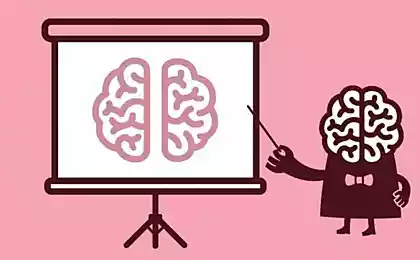520
Foreign language helps you think in any age
Foreign language stimulates attention and helps to focus regardless of whether you have started to study in early childhood or after school.
It is believed that to start to learn a foreign language best at an early age – so you will achieve much greater success than if you start learning it in adulthood. Perhaps if one looks at the language level, such recommendation makes sense. However, if we talk about overall impact on the brain, then to learn a second language "Statute of limitation" no, and even if you begin to study it as a young adult, the brain will still improve.
Last year Thomas the Tank (Thomas Bak) from the University of Edinburgh and his colleagues found that those with early childhood speaks more than one language, 4 years later starts of age-related dementia. This has forced researchers to think about how to do foreign language learning affects cognitive abilities, even if you start learning it late enough.

Another experiment consisted in the fact that several dozen young people were asked to perform several cognitive and psychological tests. For example, psychologists tested how subjects can concentrate on something, ignoring extraneous stimuli and perceiving only the necessary information. Among the participants of the experiment were those who knew only one language and no other is not taught, and there were those who held foreign. It turned out that knowing a second language was more attentive and had a greater ability to concentrate. And, most importantly, the results of the tests are not dependent on when a person started learning a second language, barely an infant or approaching twenty years. The study is published вFrontiers in Psychology.
Why has such a foreign action, it is easy to understand: a man jumps from one language to another, and the brain then learns to carefully select information (primarily speech), quickly learns to concentrate on the most important. Obviously, this ability is actually very useful and can be useful in a variety of cognitive tasks.
It is possible to find and neurobiological explanation. Not so long ago, canadian researchers from McGill University found that foreign language affects the structure of the brain: from learning a second language, we are forcing the brain to create new neural structures and to squeeze them into the existing architecture of neural circuits. It is possible that such rearrangements can occur not necessarily at that age, when the brain is most rapidly changing and evolving.
However it should be noted that some very global conclusions from this comparison bilingual people with normal to do yet. First, the study involved not a lot of people (60 knowing a foreign language and 38 "monolingual"), and secondly, psychological tests they were offered not so much, third, still, the participants were quite young, no older than 19 years. So now it would be good to study the same conduct with quite older or even elderly people who started to learn foreign languages relatively recently. In addition, it is not entirely clear what is cause and what is effect. It may be that just people with more developed mental abilities often begin to learn a foreign language.
This objection the researchers tried to take into account in another work, published вAnnals of Neurology. In it, the psychologists analyze the data on 853 people whose mental capacity is checked for the first time already in 1947, and re-test was done in 2008-2010. It turned out, those who owned a foreign language, cognitive mental state was better than you would expect at their age. Indirectly, this confirms the benefits of a second language, it helps if you do not develop, then maintain cognitive abilities at a high level. However, in this case, the researchers could not account for when exactly people started to learn a second language.
And yet the results obtained by the Thomas Tank and his staff, some psychologists are kind of skeptical. For example, Ken Paap (Ken Paap) University of California, San Francisco, commenting on colleagues ' work for the website LiveScience, says that the tests they used, not really suitable in order to assess cognitive ability in its entirety, including the ability to make decisions, memory etc. on the other hand, this is not the first study that investigates the relationship between second language and General cognitive abilities, and I must say, it is not always possible this relationship to detect.
Finally, different people have different reasons to learn a second language, and this language can be anything. In one case, it may be, for example, a resident of Wales, around which everything and always spoke Welsh and English, and in another it will be a Chinese whose parents came to the US before his birth so that he could hear only Chinese at home or away from other immigrants. And, probably, in that and in other case the brain differently to learn a second language – and this, in turn, would affect General cognitive abilities that must be considered in such studies.
Source: nkj.ru
It is believed that to start to learn a foreign language best at an early age – so you will achieve much greater success than if you start learning it in adulthood. Perhaps if one looks at the language level, such recommendation makes sense. However, if we talk about overall impact on the brain, then to learn a second language "Statute of limitation" no, and even if you begin to study it as a young adult, the brain will still improve.
Last year Thomas the Tank (Thomas Bak) from the University of Edinburgh and his colleagues found that those with early childhood speaks more than one language, 4 years later starts of age-related dementia. This has forced researchers to think about how to do foreign language learning affects cognitive abilities, even if you start learning it late enough.

Another experiment consisted in the fact that several dozen young people were asked to perform several cognitive and psychological tests. For example, psychologists tested how subjects can concentrate on something, ignoring extraneous stimuli and perceiving only the necessary information. Among the participants of the experiment were those who knew only one language and no other is not taught, and there were those who held foreign. It turned out that knowing a second language was more attentive and had a greater ability to concentrate. And, most importantly, the results of the tests are not dependent on when a person started learning a second language, barely an infant or approaching twenty years. The study is published вFrontiers in Psychology.
Why has such a foreign action, it is easy to understand: a man jumps from one language to another, and the brain then learns to carefully select information (primarily speech), quickly learns to concentrate on the most important. Obviously, this ability is actually very useful and can be useful in a variety of cognitive tasks.
It is possible to find and neurobiological explanation. Not so long ago, canadian researchers from McGill University found that foreign language affects the structure of the brain: from learning a second language, we are forcing the brain to create new neural structures and to squeeze them into the existing architecture of neural circuits. It is possible that such rearrangements can occur not necessarily at that age, when the brain is most rapidly changing and evolving.
However it should be noted that some very global conclusions from this comparison bilingual people with normal to do yet. First, the study involved not a lot of people (60 knowing a foreign language and 38 "monolingual"), and secondly, psychological tests they were offered not so much, third, still, the participants were quite young, no older than 19 years. So now it would be good to study the same conduct with quite older or even elderly people who started to learn foreign languages relatively recently. In addition, it is not entirely clear what is cause and what is effect. It may be that just people with more developed mental abilities often begin to learn a foreign language.
This objection the researchers tried to take into account in another work, published вAnnals of Neurology. In it, the psychologists analyze the data on 853 people whose mental capacity is checked for the first time already in 1947, and re-test was done in 2008-2010. It turned out, those who owned a foreign language, cognitive mental state was better than you would expect at their age. Indirectly, this confirms the benefits of a second language, it helps if you do not develop, then maintain cognitive abilities at a high level. However, in this case, the researchers could not account for when exactly people started to learn a second language.
And yet the results obtained by the Thomas Tank and his staff, some psychologists are kind of skeptical. For example, Ken Paap (Ken Paap) University of California, San Francisco, commenting on colleagues ' work for the website LiveScience, says that the tests they used, not really suitable in order to assess cognitive ability in its entirety, including the ability to make decisions, memory etc. on the other hand, this is not the first study that investigates the relationship between second language and General cognitive abilities, and I must say, it is not always possible this relationship to detect.
Finally, different people have different reasons to learn a second language, and this language can be anything. In one case, it may be, for example, a resident of Wales, around which everything and always spoke Welsh and English, and in another it will be a Chinese whose parents came to the US before his birth so that he could hear only Chinese at home or away from other immigrants. And, probably, in that and in other case the brain differently to learn a second language – and this, in turn, would affect General cognitive abilities that must be considered in such studies.
Source: nkj.ru
The us military showed gloves that allow soldiers to climb walls
Edyn - site monitoring system for organic farming























